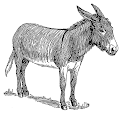A Mild And Wholly Unnecessary Defense Of Zach Braff
Like you I check my favorite web sites daily to see what I missed while I was eating, sleeping, watching Heroes, etc. This includes pitchforkmedia.com and stylusmagazine.com (the best British equivalent I've found). Both reviewed The Shins highly anticipated Wincing the Night Away the day before it dropped, as is the custom, giving decent reviews (pitchfork = 7.0, stylus = A-). Both also pointed out how The Shins have been laboring in a shadow of "Braff-lash," a phenomenon resulting from Zach Braff's rapid ascendancy to mainstream pop status on the merits of his seeming likeable, earnest, emotive, and clever - and for his active promotion of indie-pop acts possessing similar qualities. That's my own definition but it's the best I was able to piece together.
My thoughts on shoehorning celebrity names into everyday language aside, this pinched my ear. Sure, the public has a saturation point for media personalities and will rightly reject those whose handlers don't know when to back off. I will also concede that Braff's on-screen persona can veer into some pretty thick cheese. But the guy has hardly entered the realm of celeb-ubiquity in a post Paris Hilton age, nor can his sappy, goofball antics disqualify him as socially relevant as long as there is a Hallmark store anywhere on Earth. Neither form of celebrity nuisance is at issue here. It’s a question of style vs. content.
If one has a negative reaction to Braff’s style - not necessarily who he is but the supposedly charming yet slightly smug characters he plays or his hipster dude-who-knew-about-Death-Cab-before-you persona, however artificially imposed it might be – then one might be inclined to reject another formal element with which he is associated, ie. music. It would be easy to reduce Braff’s man-boy character JD (Scrubs) to something so easily dismissible. The character is intentionally puddle deep, an innocent narrator and Chaplainesque clown meant to exist for thirty minutes, sell whatever NBC is selling and then evaporate. JD listens to Toto.
Braff, on the other hand, made a mix-tape that won him a Grammy (Garden State) and exposed a mainstream audience to the joys of a few bands they might not have otherwise heard. Dismissing Braff or his allegiance to a certain kind of music, however emotive or independent, makes the mistake of assuming that he is dictating a style rather than filling a need for content - style being what sounds good and content being what sounds right. Ultimately, it’s a bit of both.
The Shins and other bands do what they do independent of Zach Braff and his hair or whatever else it is about him people don’t like, and while Garden State’s popularity gained The Shins and Iron & Wine a larger audience, the music gained them critical acclaim. I hope Zach Braff continues to champion independent artists like Amos Lee, Rachael Yamagata, Turin Brakes, and Joshua Radin just like I will continue writing about them here, hoping my next mix-tape goes platinum.
For some real Braff-love check out this high-larious video on youtube.
If one has a negative reaction to Braff’s style - not necessarily who he is but the supposedly charming yet slightly smug characters he plays or his hipster dude-who-knew-about-Death-Cab-before-you persona, however artificially imposed it might be – then one might be inclined to reject another formal element with which he is associated, ie. music. It would be easy to reduce Braff’s man-boy character JD (Scrubs) to something so easily dismissible. The character is intentionally puddle deep, an innocent narrator and Chaplainesque clown meant to exist for thirty minutes, sell whatever NBC is selling and then evaporate. JD listens to Toto.
Braff, on the other hand, made a mix-tape that won him a Grammy (Garden State) and exposed a mainstream audience to the joys of a few bands they might not have otherwise heard. Dismissing Braff or his allegiance to a certain kind of music, however emotive or independent, makes the mistake of assuming that he is dictating a style rather than filling a need for content - style being what sounds good and content being what sounds right. Ultimately, it’s a bit of both.
The Shins and other bands do what they do independent of Zach Braff and his hair or whatever else it is about him people don’t like, and while Garden State’s popularity gained The Shins and Iron & Wine a larger audience, the music gained them critical acclaim. I hope Zach Braff continues to champion independent artists like Amos Lee, Rachael Yamagata, Turin Brakes, and Joshua Radin just like I will continue writing about them here, hoping my next mix-tape goes platinum.
For some real Braff-love check out this high-larious video on youtube.


